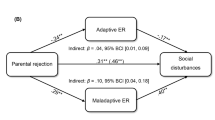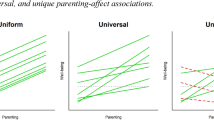Abstract
Dramatic changes occur during adolescence, elevating vulnerability to mental health problems. This study investigated the differential effect of autonomy-supportive parenting on adolescent mental health outcomes and the moderating role of adolescent emotional reactivity. We hypothesized that autonomy-supportive parenting would be beneficial for adolescents’ mental health and that emotional reactivity would moderate this effect, such that low adolescent emotional reactivity plus high autonomy-supportive parenting would produce higher positive affect and flourishing and lower negative affect, depression, and anxiety. This study included 188 adolescents from two-caregiver families who completed surveys on autonomy-supportive parenting and emotional reactivity at baseline survey: positive affect, flourishing, negative affect, anxiety, and depression at baseline and 12-month follow-up assessments. Results indicated that higher levels of autonomy-supportive parenting were associated with increased flourishing and decreased negative affect and anxiety 12 months later. Interaction analysis revealed that for adolescents with low emotional reactivity, higher levels of autonomy-supportive parenting were associated with increases in positive affect and flourishing and decreases in negative affect and depression. For adolescents with high emotional reactivity, higher levels of autonomy-supportive parenting were associated with decreases in positive affect and flourishing. These findings underscore the importance of considering the role of adolescent emotional reactivity in understanding the effects of autonomy-supportive parenting on adolescent well-being, especially when personalizing parenting-focused interventions.
Highlights
-
Adolescents’ emotional reactivity moderated the association between autonomy-supportive parenting and adolescent mental health outcomes.
-
Autonomy-supportive parenting is beneficial for adolescents who are less emotionally reactive: it was positively associated with positive affect and flourishing and negatively associated with negative affect and depression.
-
For adolescents who are high in emotional reactivity, autonomy-supportive parenting was a risk factor: it was associated with greater decreases in positive affect and flourishing.


Similar content being viewed by others
Data Availability
Data are available upon reasonable request to the corresponding author.
Code Availability
Code is available upon reasonable request to the corresponding author.
References
Backes, E. P., & Bonnie, R. J. (2019). The promise of adolescence: Realizing opportunity for all youth. The Promise of Adolescence. https://doi.org/10.17226/25388.
Bai, S., & Repetti, R. L. (2015). Short-term resilience processes in the family. Family Relations, 64(1), 108–119. https://doi.org/10.1111/FARE.12101.
Bi, X., Yang, Y., Li, H., Wang, M., Zhang, W., & Deater-Deckard, K. (2018). Parenting styles and parent–adolescent relationships: The mediating roles of behavioral autonomy and parental authority. Frontiers in Psychology, 9, 2187. https://doi.org/10.3389/fpsyg.2018.02187.
Blakemore, S. J. (2019). Adolescence and mental health. The Lancet, 393(10185), 2030–2031.
Brenning, K., Soenens, B., van Petegem, S., & Vansteenkiste, M. (2015). Perceived maternal autonomy support and early adolescent emotion regulation: A longitudinal study. https://doi.org/10.1111/sode.12107.
Bylsma, L. M., Morris, B. H., & Rottenberg, J. (2008). A meta-analysis of emotional reactivity in major depressive disorder. Clinical Psychology Review, 28(4), 676–691. https://doi.org/10.1016/J.CPR.2007.10.001.
Carver, C. S., Johnson, S. L., & Joormann, J. (2013). Major depressive disorder and impulsive reactivity to emotion: Toward a dual-process view of depression. British Journal of Clinical Psychology, 52(3), 285–299. https://doi.org/10.1111/BJC.12014.
Chorpita, B. F., Yim, L., Moffitt, C., Umemoto, L. A., & Francis, S. E. (2000). Assessment of symptoms of DSM-IV anxiety and depression in children: a revised child anxiety and depression scale. Behaviour Research and Therapy, 38(8), 835–855. https://doi.org/10.1016/S0005-7967(99)00130-8.
Clayborne, Z. M., Varin, M., & Colman, I. (2019). Systematic review and meta-analysis: Adolescent depression and long-term psychosocial outcomes. Journal of the American Academy of Child & Adolescent Psychiatry, 58(1), 72–79. https://doi.org/10.1016/J.JAAC.2018.07.896.
Collins, L. M., Murphy, S. A., & Bierman, K. L. (2004). A conceptual framework for adaptive preventive interventions. Prevention Science, 5(3), 185–196. https://doi.org/10.1023/B:PREV.0000037641.26017.00.
Deci, E. L., & Ryan, R. M. (1987). The support of autonomy and the control of behavior. Journal of Personality and Social Psychology, 53(6), 1024.
Deci, E. L., & Ryan, R. M. (2008). Self-determination theory: A macrotheory of human motivation, development, and health. Canadian Psychology, 49(3), 182–185. https://doi.org/10.1037/A0012801.
Diener, E., Wirtz, D., Tov, W., Kim-Prieto, C., Choi, D. W., Oishi, S., & Biswas-Diener, R. (2010). New well-being measures: Short scales to assess flourishing and positive and negative feelings. Social Indicators Research, 97, 143–156. https://doi.org/10.1007/s11205-009-9493-y.
Dishion, T. J., Nelson, S. E., & Bullock, B. M. (2004). Premature adolescent autonomy: parent disengagement and deviant peer process in the amplification of problem behaviour. Journal of Adolescence, 27(5), 515–530. https://doi.org/10.1016/J.ADOLESCENCE.2004.06.005.
Eysenck, M. W., & Fajkowska, M. (2017). Anxiety and depression: Toward overlap** and distinctive features, 32(7), 1391–1400. https://doi.org/10.1080/02699931.2017.1330255.
Fergus, S., & Zimmerman, M. A. (2005). Adolescent resilience: A framework for understanding healthy development in the face of risk. Annual Review of Public Health, 26, 399–419. https://doi.org/10.1146/annurev.publhealth.26.021304.144357.
Fosco, G. M., & Lobraico, E. J. (2019). Elaborating on premature adolescent autonomy: Linking variation in daily family processes to developmental risk. Development and Psychopathology, 31(5), 1741–1755. https://doi.org/10.1017/S0954579419001032.
Han, C. S., Brussoni, M. J., & Mâsse, L. C. (2022). Parental autonomy support in the context of parent–child negotiation for children’s independent mobility: ‘I always feel safer with my parents’ to ‘boom! bust down those walls!’ The Journal of Early Adolescence, 42(6), 737. https://doi.org/10.1177/02724316211064513.
Hashmi, S. (2013). Adolescence: An age of storm and stress. Review of Arts and Humanities, 2(1), 19–33.
Johnson, P. O., & Fay, L. C. (1950). The Johnson-Neyman technique, its theory and application. Psychometrika, 15(4), 349–367.
Jones, R. (2011). Bayesian information criterion for longitudinal and clustered data. Statistics in Medicine, 30. https://doi.org/10.1002/sim.4323.
Kessler, R. C., Berglund, P., Demler, O., **, R., Merikangas, K. R., & Walters, E. E. (2005). Lifetime prevalence and age-of-onset distributions of DSM-IV disorders in the national comorbidity survey replication. Archives of General Psychiatry, 62(6), 593–602. https://doi.org/10.1001/ARCHPSYC.62.6.593.
Keyes, K. M., Gary, D., O’Malley, P. M., Hamilton, A., & Schulenberg, J. (2019). Recent increases in depressive symptoms among US adolescents: Trends from 1991 to 2018. Social Psychiatry and Psychiatric Epidemiology, 54(8), 987–996. https://doi.org/10.1007/S00127-019-01697-8.
Lansford, J. E., & Banati, P. (2018). Handbook of adolescent development research and its impact on global policy. In Handbook of adolescent development research and its impact on global policy. Oxford University Press. https://doi.org/10.1093/oso/9780190847128.001.0001.
Laursen, B., & Collins, W. A. (2009). Parent-child relationships during adolescence. Handbook of adolescent psychology. https://doi.org/10.1002/9780470479193.ADLPSY002002.
Lekes, N., Gingras, I., Philippe, F. L., Koestner, R., & Fang, J. (2010). Parental autonomy-support, intrinsic life goals, and well-being among adolescents in China and North America. Journal of Youth and Adolescence, 39(8), 858–869. https://doi.org/10.1007/S10964-009-9451-7.
Li, Z. S., & Hasson, F. (2020). Resilience, stress, and psychological well-being in nursing students: A systematic review. Nurse Education Today, 90, 104440. https://doi.org/10.1016/J.NEDT.2020.104440.
Locke, J. Y., Campbell, M. A., & Kavanagh, D. (2012). Can a parent do too much for their child? An examination by parenting professionals of the concept of overparenting. Journal of Psychologists and Counsellors in Schools, 22(2), 249–265. https://doi.org/10.1017/JGC.2012.29.
De Los Reyes, A., & Kazdin, A. E. (2005). Informant discrepancies in the assessment of childhood psychopathology: A critical review, theoretical framework, and recommendations for further study. Psychological Bulletin, 131(4), 483. https://doi.org/10.1037/0033-2909.131.4.483.
Marbell, K. N., & Grolnick, W. S. (2013). Correlates of parental control and autonomy support in an interdependent culture: A look at Ghana. Motivation and Emotion, 37, 79–92. https://doi.org/10.1007/s11031-012-9289-2.
Masten, A. S. (2018). Resilience theory and research on children and families: Past, present, and promise. Journal of Family Theory & Review, 10(1), 12–31. https://doi.org/10.1111/JFTR.12255.
Neubauer, A. B., Schmidt, A., Kramer, A. C., & Schmiedek, F. (2021). A little autonomy support goes a long way: Daily autonomy-supportive parenting, child well-being, parental need fulfillment, and change in child, family, and parent adjustment across the adaptation to the COVID-19 pandemic. Child Development, 92(5), 1679–1697. https://doi.org/10.1111/CDEV.13515.
Nikmanesh, Z., Oshtorak, N., & Molla, M. D. (2020). The mediating role of positive and negative affect in the association of perceptions of parenting styles with resilience among adolescents with addicted parents. Iranian Journal of Psychiatry, 15(4), 297. https://doi.org/10.18502/IJPS.V15I4.4295.
Nock, M. K., Wedig, M. M., Holmberg, E. B., & Hooley, J. M. (2008). The emotion reactivity scale: Development, evaluation, and relation to self-injurious thoughts and behaviors. Behavior Therapy, 39(2), 107–116. https://doi.org/10.1016/J.BETH.2007.05.005.
Pitzer, J., & Skinner, E. (2017). Predictors of changes in students’ motivational resilience over the school year: The roles of teacher support, self-appraisals, and emotional reactivity. International Journal of Behavioral Development, 41(1), 15–29. https://doi.org/10.1177/0165025416642051.
Purdie, N., Carroll, A., & Roche, L. (2004). Parenting and adolescent self-regulation. Journal of Adolescence, 27(6), 663–676. https://doi.org/10.1016/J.ADOLESCENCE.2004.01.002.
Ramos-Díaz, E., Rodríguez-Fernández, A., Axpe, I., & Ferrara, M. (2019). Perceived emotional intelligence and life satisfaction among adolescent students: The mediating role of resilience. Journal of Happiness Studies, 20(8), 2489–2506. https://doi.org/10.1007/S10902-018-0058-0.
Ryan, R. M., & Deci, E. L. (2000). Intrinsic and extrinsic motivations: Classic definitions and new directions. Contemporary Educational Psychology, 25(1), 54–67. https://doi.org/10.1006/CEPS.1999.1020.
Van Ryzin, M. J., Roseth, C. J., Fosco, G. M., Lee, Y. K., & Chen, I. C. (2016). A component-centered meta-analysis of family-based prevention programs for adolescent substance use. Clinical Psychology Review, 45, 72–80. https://doi.org/10.1016/j.cpr.2016.03.007.
Schweder, R. A., & Sullivan, M. A. (1993). Cultural psychology: Who needs it? Annual Review of Psychology, 44, 497–523. https://doi.org/10.1146/annurev.psych.44.1.497.
Shapero, B. G., & Steinberg, L. (2013). Emotional reactivity and exposure to household stress in childhood predict psychological problems in adolescence. Journal of Youth and Adolescence, 42, 1573–1582. https://doi.org/10.1007/s10964-013-9954-0.
Shapero, B. G., Abramson, L. Y., & Alloy, L. B. (2016). Emotional reactivity and internalizing symptoms: Moderating role of emotion regulation. Cognitive Therapy and Research, 40(3), 328–340. https://doi.org/10.1007/S10608-015-9722-4.
Silk, J. S., Siegle, G. J., Whalen, D. J., Ostapenko, L. J., Ladouceur, C. D., & Dahl, R. E. (2009). Pubertal changes in emotional information processing: Pupillary, behavioral, and subjective evidence during emotional word identification. Development and Psychopathology, 21(1), 7–26. https://doi.org/10.1017/S0954579409000029.
Soenens, B., Vansteenkiste, M., & Sierens, E. (2009). How are parental psychological control and autonomy-support related? A cluster-analytic approach. Journal of Marriage and Family, 71(1), 187–202. https://doi.org/10.1111/J.1741-3737.2008.00589.X.
Soenens, B., Vansteenkiste, M., & van Petegem, S. (2015). Let us not throw out the baby with the bathwater: Applying the principle of universalism without uniformity to autonomy-supportive and controlling parenting. Child Development Perspectives, 9(1), 44–49. https://doi.org/10.1111/CDEP.12103.
Soenens, B., Vansteenkiste, M., Lens, W., Luyckx, K., Goossens, L., Beyers, W., & Ryan, R. M. (2007). Conceptualizing parental autonomy support: Adolescent perceptions of promotion of independence versus promotion of volitional functioning. Developmental Psychology, 43(3), 633–646. https://doi.org/10.1037/0012-1649.43.3.63.
Spitzer, R. L., Kroenke, K., Williams, J. B. W., & Löwe, B. (2006). A brief measure for assessing generalized anxiety disorder: The GAD-7. Archives of Internal Medicine, 166(10), 1092–1097. https://doi.org/10.1001/ARCHINTE.166.10.1092.
Terry, P. C., Lane, A. M., & Fogarty, G. J. (2003). Construct validity of the Profile of Mood States — Adolescents for use with adults. Psychology of Sport and Exercise, 4(2), 125–139. https://doi.org/10.1016/S1469-0292(01)00035-8.
van Leeuwen, K. G., Mervielde, I., Braet, C., & Bosnians, G. (2004). Child personality and parental behavior as moderators of problem behavior: Variable- and person-centered approaches. Developmental Psychology, 40(6), 1028–1046. https://doi.org/10.1037/0012-1649.40.6.1028.
Van Rijsbergen, G. D., Bockting, C. L. H., Burger, H., Spinhoven, P., Koeter, M. W. J., Ruhé, H. G., Hollon, S. D., Schene, A. H., & Bockting, L. H. (2013). Mood reactivity rather than cognitive reactivity is predictive of depressive relapse: A randomized study with 5.5-year follow-up. Association, 81(3), 508–517. https://doi.org/10.1037/a0032223.
Vasquez, A. C., Patall, E. A., Fong, C. J., Corrigan, A. S., & Pine, L. (2016). Parent autonomy support, academic achievement, and psychosocial functioning: A meta-analysis of research. Educational Psychology Review, 28(3), 605–644. https://doi.org/10.1007/S10648-015-9329-Z/TABLES/9.
Vrieze, S. (2012). Model selection and psychological theory: A discussion of the differences between the Akaike information criterion (AIC) and the Bayesian information criterion (BIC). Psychological Methods, 17(2), 228–243. https://doi.org/10.1037/a0027127.
Wang, Q., Pomerantz, E. M., & Chen, H. (2007). The role of parents’ control in early adolescents’ psychological functioning: A longitudinal investigation in the United States and China. Child Development, 78, 1592–1610. https://doi.org/10.1111/j.1467-8624.2007.01085.x.
Werner, E. E., & Smith, R. S. (1992). Overcoming the odds: high risk children from birth to adulthood. Cornell University Press.
Yu, S., Levesque-Bristol, C., & Maeda, Y. (2018). General need for autonomy and subjective well-being: A meta-analysis of studies in the US and East Asia. Journal of Happiness Studies, 19, 1863–1882.
Acknowledgements
We would like to thank the participating families and contributing schools that make this work possible. We gratefully acknowledge the contributions of Mengya **a, Hio Wa Mak, Keiana Mayfield, Emily LoBraico, Amanda Ramos, and Devin Malloy for their assistance in collecting and preparing the data.
Funding
This study was funded by the Karl R. and Diane Wendle Fink Early Career Professorship for the Study of Families (Fosco). L.C. was supported by the Prevention and Methodology Training Program (T32 DA017629; MPIs: J. Maggs & S. Lanza) with funding from the National Institute on Drug Abuse. The content is solely the responsibility of the authors and does not necessarily represent the official views of the National Institute on Drug Abuse or the National Institutes of Health.
Author information
Authors and Affiliations
Contributions
L.C.: developed research questions, conducted literature review, performed data analyses, and wrote and edited the manuscript. G.M.F.: obtained study funding, designed overarching study, supervised data collection, supervised manuscript design, analysis, and writing, edited drafts of the manuscript. S.L.T.: assisted with manuscript editing.
Corresponding author
Ethics declarations
Conflict of Interest
All authors declare no conflict of interest.
Ethical approval
All procedures performed in this study involving human subjects were in accordance with the ethical standards of the institutional and/or national research committee and with the 1964 Helsinki declaration and its later amendments or comparable ethical standards. This study was approved by the Institutional Review Board (IRB) of The Pennsylvania State University (Protocol number: 0472, Title: Family Relationships and Adolescent Well-Being).
Consent to Participate
Informed consent/assent was obtained from all participants included in the study.
Additional information
Publisher’s note Springer Nature remains neutral with regard to jurisdictional claims in published maps and institutional affiliations.
Rights and permissions
Springer Nature or its licensor (e.g. a society or other partner) holds exclusive rights to this article under a publishing agreement with the author(s) or other rightsholder(s); author self-archiving of the accepted manuscript version of this article is solely governed by the terms of such publishing agreement and applicable law.
About this article
Cite this article
Chen, L., Fosco, G.M. & Tornello, S.L. Who benefits from autonomy-supportive parenting? Considering individual difference in adolescent emotional reactivity. J Child Fam Stud 33, 1184–1197 (2024). https://doi.org/10.1007/s10826-024-02807-0
Accepted:
Published:
Issue Date:
DOI: https://doi.org/10.1007/s10826-024-02807-0




